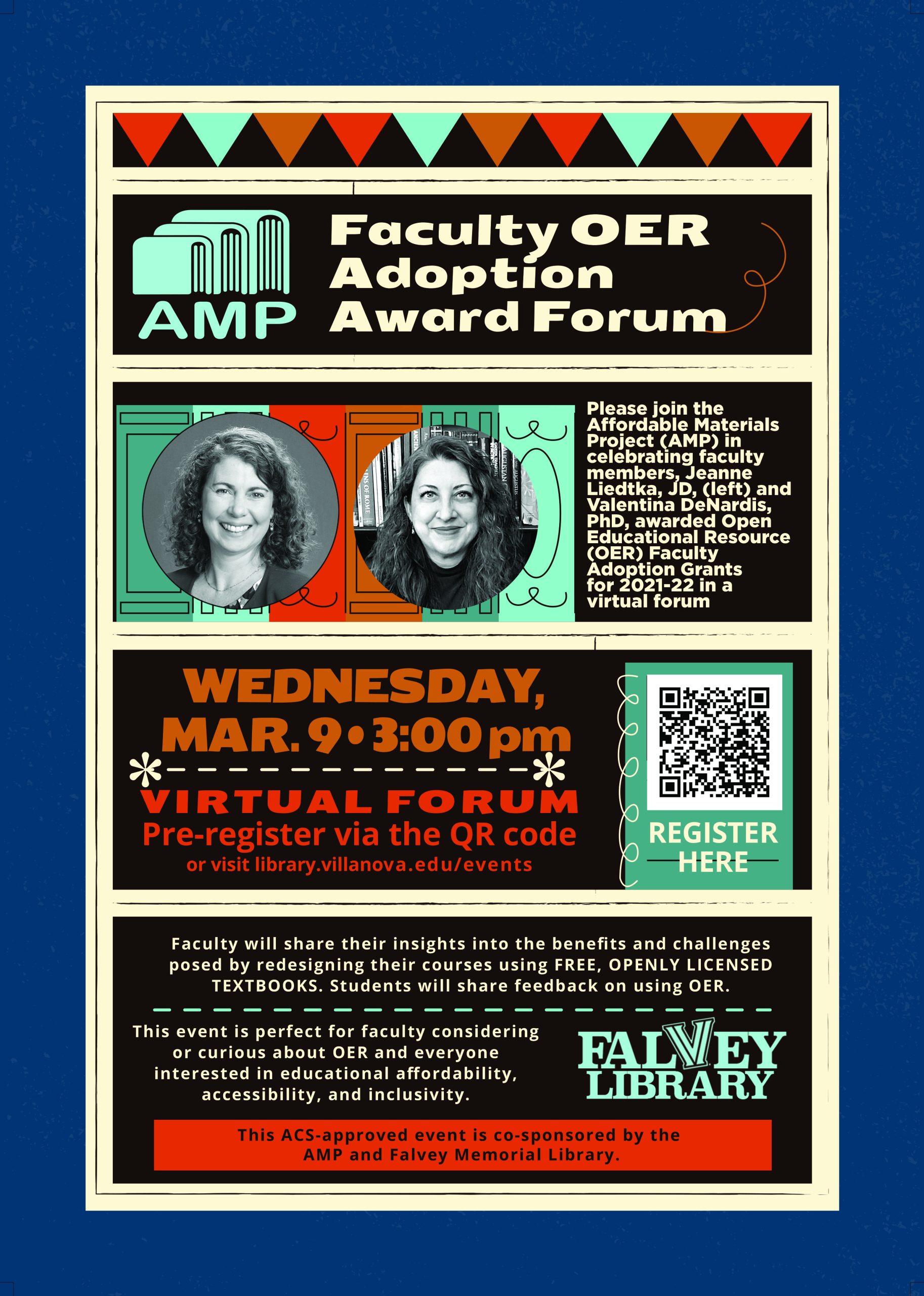A Faculty Perspective on Using OER in the Classroom
Dr. Alicia Strandberg, a recipient of the 2022-23 OER Faculty Adoption Grant, shared reflections about using open educational resources in MSA 8115, a graduate level course on Multivariate Data Analysis. The questions I asked her about are in bold and a loosely transcribed summary of Dr. Strandberg’s responses follow.
a graduate level course on Multivariate Data Analysis. The questions I asked her about are in bold and a loosely transcribed summary of Dr. Strandberg’s responses follow.
Why did you choose free to use, open licensed books instead of commercial textbooks for this course?
The students in this course have unique characteristics. The program is 100% online and this is the final course in a cohort sequence. I needed resources for all different types of learners coming from different backgrounds. The age and work experience distribution is broad. Some students are recent undergraduates, others have extensive work experience. There isn’t one book to meet their varied needs. I was fortunate that the standard textbook is open. The additional texts I discovered while preparing the course. I found them useful for offering an alternative perspective, so thought students might too.
I didn’t want to overwhelm students with resources, so it is important to find a balance. If using multiple resources, I recommend labeling key and optional materials. Beyond that it is helpful to specify which optional materials are helpful for students struggling with specific topics. In my experience, students are less likely to use an undifferentiated list of resources, they are more likely to use them when given a path mapping topics to resources.
One shortcoming is that I’m not aware of a way to track student usage of these materials. It would be helpful to know how often students utilize these resources and which materials are more popular or less popular.
Tracking usage is a key feature of many online learning systems because it can be used to determine where students have difficulties and need more support, but it also may undermine privacy and have a negative effect on the student-faculty relationship…
I agree there are some concerns there, but I don’t need personalized data. I would love to have information that showed how many students used a resource, such as in a class of twenty five, seven students used one resource. I don’t need to know which seven students may have used it. That may tell me where more attention needs to be focused. Meaningful insights can be given by counts. For example, knowing if there were seven different students or the same one student revisiting a resource could help me address or change my approach to some of the topics.
Were the open resources different than commercial textbooks you’ve used?
I don’t think the textbooks themselves were different, but how students accessed them was. Because it’s an online course all materials were supplied as links. I did recieve feedback from a small group of students that they missed paper textbooks and some purchased paper editions, but that is a very small group of students. So I think it is working well.
What works was involved in redesigning the course around openly licensed books?
It helps that I was the creator of the course. Because it was going to be an online course, in the design phase we were encouraged to look at open materials and we were challenged to keep costs low for students especially because they are paying graduate tuition. It was a bit of luck that I really liked the main textbook and it is open. It is an intermediate book, so I knew for some students it would be challenging to jump in. I needed other resources for students who might need to catch up to the intermediate level. Faculty collaborated in workshops when designing this program and some of the supplementary materials are used in other courses too.
That’s great, I didn’t realize that on the faculty team level there was such a focus on choosing open and affordable materials. Do you think that orientation is common or maybe specific to this program.
I think there are bright spots where it is really encouraged and other places where it might be mentioned. In my experience I see it more often at the graduate level. My undergraduate courses use commercial textbooks, and I don’t think it is realistic to use all open materials, but I do like to use open source materials as optional resources whenever possible. That way students that need extra support don’t have to pay an extra fee for materials.
You received a small award for using open educational resources. Do you think this is a good way to encourage adoption of OER? Can you think of other services that the university could provide?
I’m very grateful to have received this award. This award highlights that open educational resources are of value to Villanova. The award brings awareness.
To spread the word and have more involvement, I believe taking a team approach would be beneficial. It would be helpful to know where to find open resources and library resources, knowing that at the end of the day everything we do is to make our students stronger and more capable and successful. If we can make that path a little easier by relieving the burden of some textbook costs, that’s a good thing to do. Having conversations at faculty and program meetings will get more people to think about it.
Do you think using OER had any impact on the classroom dynamic?
In all my classes I like to believe students get the most from being in the (virtual) classroom and participating in active classes. The materials help aid our discussion. Assuming my belief its true, I don’t think there is much difference between a commercial or open textbook, assuming they are both of high quality.
I have had conversations with colleagues about what students do when they need help in the moment, since faculty cannot always be immediately available. In these moments, many students turn to the internet, where they may or may not find relevant materials or high quality information. I like to think that when I recommend websites and open source materials on Blackboard, my students will turn to those first. I know that part of my job is to enable students to recognize quality material too.
Do you have any advice for colleagues that may be considering using OER?
You don’t have to change your primary textbook. I would start small. For me what worked well was adding OER as additional resources, then telling students which chapters in the open access resources supplement the primary textbook is helpful. You don’t have to do this for every topic. I started by paying attention to patterns in the emails student sent looking for clarification on specific topics. The questions weren’t evenly distributed, so I focused on the challenging topics. This approach actually lessened the volume of emails students sent asking for help. Both sides win; students get what they need and it eases the workload for faculty. I like to remind students about these resources, letting them know that I will always respond to their questions but they may be able to get help in the moment by using the recommended OER.


 Linda Hauck is the Business Librarian at Falvey Memorial Library and
Linda Hauck is the Business Librarian at Falvey Memorial Library and 



 Linda Hauck is the Business Librarian at Falvey Memorial Library and Affordable Materials Project member.
Linda Hauck is the Business Librarian at Falvey Memorial Library and Affordable Materials Project member.